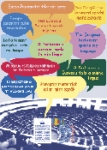Breadcrumbs
Blog
- Details
- News
 Leading magazines for upcoming events and happenings are regularly published and there are weekly Rome event guides that are readily available. They contain up-to-date listings of events throughout Italy, with a focus on Rome and are aimed specifically at tourists and visitors. These magazines are a useful source for shopping, dining and entertainment - providing you with a huge choice of things to see and do in Rome.
Leading magazines for upcoming events and happenings are regularly published and there are weekly Rome event guides that are readily available. They contain up-to-date listings of events throughout Italy, with a focus on Rome and are aimed specifically at tourists and visitors. These magazines are a useful source for shopping, dining and entertainment - providing you with a huge choice of things to see and do in Rome.
Rome National Public Holidays
- 1st January - New Year's Day
- 6th January - Epiphany
- Early April - Easter Monday
- 25th April - Liberation Day
- 1st May - Labour Day
- 29th June - Local Feast Day
- 15th August - Assumption of the Blessed Virgin Mary
- 1st November - All Saints
- 8th December - Immaculate Conception of the Blessed Virgin Mary
- 24th December - Christmas Eve
- 25th December - Christmas Day
- 26th December - Boxing Day / St. Stephen's Day
Rome Events in January - Rome
- Epiphany - early January, religious holiday called Befana in Italian. An ordination of new bishops takes place in St. Peter's Basilica. There is also an Epiphany fair held in the Piazza Navona
- Feast of St. Antonio - January 17th, general celebrations
Rome Events in February - Rome
- Ash Wednesday - late February, the Pope walks from the Basilica of Santa Sabina to the Circus Maximus, accompanied by members of the College of Cardinals
Rome Events in March - Rome
- Festival of St. Francesca - early March, Roman's drive their cars to the Piazzale del Colosseo, near the Church of Santa Francesca for blessing
- Feast of St. Joseph - mid-March, people celebrating the feast day of St. Joseph go to the Trionfale Quarter to eat a traditional type of doughnut
- Festival of Giuseppe - mid-March, including sporting and musical events, held in the Trionfale Quarter
- Maratona della Citta di Roma (marathon) - late March, this marathon is watched by crowds of people and the athletes run past many of the city's spectacular landmarks
Rome Events in April - Rome
- Festa della Primavera (Spring Festival) - early April, the Spanish Steps are decorated with azalea plants and concerts are held in Trinita dei Monti
- Good Friday - early April, the Pope leads the Procession of the Cross from the Colosseum to the Forum, in the evening
- Easter - mid-April, an outdoor mass takes place in St. Peter's Square in the morning, with 20,000 reserved seats. The Pope then blesses the crowds at noon
- Easter Monday - mid-April, many Romans head for the country and there are often celebrations at the Castel Sant'Angelo
- Concerts - throughout April, the Accademia Filarmonica Romana performs regularly at the Teatro Olimpico
Rome Events in May - Rome
- New Vatican Guard - May 6th, swearing in for the new guard at the Vatican on the anniversary of the Sacking of Rome
- Tennis - early mid-May, the Masters Series Roma begins at the Parco del Foro Italico
- Corpus Domini - mid-May, festival when a street is laid with floral carpets in elaborate motifs
- Concerts - throughout May, the Accademia Filarmonica Romana performs regularly at the Teatro Olimpico
- Chamber and symphony concerts - throughout May, the Accademia Nazionale di Santa Cecilia performs at the Via della Conciliazione
Rome Events in June - Rome
- Festa della Republica - first Sunday in June, military parade centres on Via dei Fori Imperiali
- Football / Soccer - throughout June, matches are held at the Stadio Olimpica at Via del Gladiatori and played in the afternoon
- Saints Peter and Paul Day - late June, solemn masses are held at St. Peter's Basilica and elsewhere during this public holiday
- Pesaro Film Festival - late June, also known as the International Exhibition of New Cinema, showcasing works of new directors and also old films from many countries
Rome Events in July - Rome
- 4th of July - American celebrations in the city, including a picnic and fireworks
- Castel Madama - mid-June, parade in 16th-century costume and also horse races
- Spoleto Festival - early to mid-July, held in Spoleto, this festival presents top-quality concerts, opera, dance, theatre and film
- Operas and ballets - throughout July and early August, these are staged regularly at Teatro dell'Opera, Piazza Beniamino Gigli
- Noianti Festival - mid to late July, folk music, dancing, parade floats and fireworks at Trastevere, in honour of the Virgin Carmine
Rome Events in August - Rome
- Festa della Madonna della Neve - August 5th, open-air film festival, held at Santa Maria
- Feast of Our Lady of the Snow - early August, services at Santa Maria Maggiore, Via G. Alberto 47
- Ferragosta (The Assumption) - August 15th, the midsummer Roman holiday. A great many places close down on this day
Rome Events in September - Rome
- Crafts show - late September, takes place in Via dell'Orso
Rome Events in October - Rome
- Feast of St. Francis of Assisi - early October, flowers are laid at the monument to St. Francis and at other statues, near San Giovanni, Laterano
Rome Events in November - Rome
- All Saints' Day - early November, many churches that are usually closed may be open for visiting on this public holiday
- Unity Day - early November, marking World War I and Armed Forces Day, there is a ceremony at the Tomb of the Unknown Soldier at Piazza Navona
Rome Events in December - Rome
- Feast of the Immaculate Conception - early December, the Pope or his envoy places flowers at the column of the Virgin in Piazza di Spagnathis religious holiday
- St. Stephen's Day - December 26th, many Romans visit nativity scenes in churches throughout Rome on this public holiday
- New Year's Eve - December 31st, masses are celebrated in churches and traditionally, broken crockery is tossed from balconies. There are also many parties and general celebrations
- Details
- News
 Il 2010 sarà l’anno dei tablet pc, hanno previsto molti analisti. E in prima fila potrebbe esserci la Apple. La ridda di voci su un possibile nuovo prodotto della Mela morsicata è ormai giunta al suo parossismo, e ora anche l’autorevole Independent si aggiunge alla lista di testate che stanno scommettendo sull’esistenza dell’ennesimo gadget firmato Steve Jobs.
Il 2010 sarà l’anno dei tablet pc, hanno previsto molti analisti. E in prima fila potrebbe esserci la Apple. La ridda di voci su un possibile nuovo prodotto della Mela morsicata è ormai giunta al suo parossismo, e ora anche l’autorevole Independent si aggiunge alla lista di testate che stanno scommettendo sull’esistenza dell’ennesimo gadget firmato Steve Jobs.- Details
- News
The first regulation adopted by the European Communities in 1958 laid down that the official languages of the institutions would be the four languages - Dutch, French, German and Italian - of the founding countries, Belgium, France, Germany, Italy, Luxembourg and the Netherlands.
With each successive enlargement the languages of the new Member States were added. In 1973, Danish, English and Irish were added (Irish with a special status as 'Treaty language' meaning that Ireland's Act of Accession and the basic texts relating to Ireland were translated), followed by Greek in 1981, Portuguese and Spanish in 1986 and Finnish and Swedish in 1995. In 2004, Czech, Estonian, Hungarian, Latvian, Lithuanian, Maltese, Polish, Slovak and Slovene became official EU languages.
Since 1 January 2007, the European Union has had a total of 23 official languages following the accession of Bulgaria and Romania, Irish having also become an official language on the same date.
These 23 official languages make a total of 506 possible combinations, since each language can be translated into 22 others. In order to meet this challenge, the European Parliament has set up highly efficient interpreting, translation and legal text verification services. Very strict rules have been put in place to guarantee the efficiency of these services and to hold the budgetary cost down to reasonable levels.
- Details
- News
Firmly rooted in the European treaties, multilingualism is the reflection of the cultural and linguistic diversity of the European Union. It also makes the European institutions more accessible and transparent for the general public, which constitutes a guarantee for the success of the EU's democratic system.
The European Parliament differs from the other EU institutions through its obligation to ensure the highest possible degree of multilingualism. All EU citizens must be able to refer to legislation directly concerning them in the language of their country. Furthermore, since every European citizen has the right to stand for election to the European Parliament, it is unreasonable to require Members to have a perfect command of one of the common languages. The right of each Member to read parliamentary documents, to follow debates and to speak in his/her own language is expressly recognised in Parliament's Rules of Procedure. In addition, in its role as legislator the European Parliament is obliged to guarantee that the linguistic quality of all the laws which it adopts is beyond reproach in all official languages.
The Treaty provisions also allow all European citizens to follow Parliament's work, to ask questions and to receive replies in their own language.
|
|
- Details
- News
Sabena, Sky Europe and Olympic Airlines are just three of the large carriers that have gone bankrupt due to a combination of high fuel costs, competition and new security measures after 9/11.
Transport Chair Brian Simpson speaks of "clear loophole"
On 7 October during the plenary session in Brussels, the Chair of the all-party Transport Committee, Brian Simpson (Labour, North West of England), formally asked the European Commissioner for Transport Antonio Tajani to set up "a reserve compensation fund" and consider updating passengers' rights legislation.
He told fellow MEPs that "here we have a clear loophole and it would be preferable for all if we could work together and fill it in".
He added: "We have also floated the idea of establishing a reserve compensation fund, but this must not be seen as a demand. We merely wish to open up the debate as to what mechanism will help us best solve this problem."
Mr Simpson went on to say that "many of these people are not regular business flyers or regular flyers like ourselves, and they do not have the financial means to deal with this sort of upheaval. They are normally from those families who spend their savings on a family holiday, only to see their hard-earned money go down the drain through little fault of their own".
Transport Commissioner Tajani backs compensation
Speaking in October Commissioner Tajani told Members that "passengers should indeed receive compensation. We are working on specific measures to find the best solution". He said that one solution "would be changes in bankruptcy law in the member states".
There is a consensus across the Parliament's main political groups that the European Union needs to do more to help passengers stranded by bankrupt airlines. A Parliamentary resolution is due to be tabled later in the autumn.







